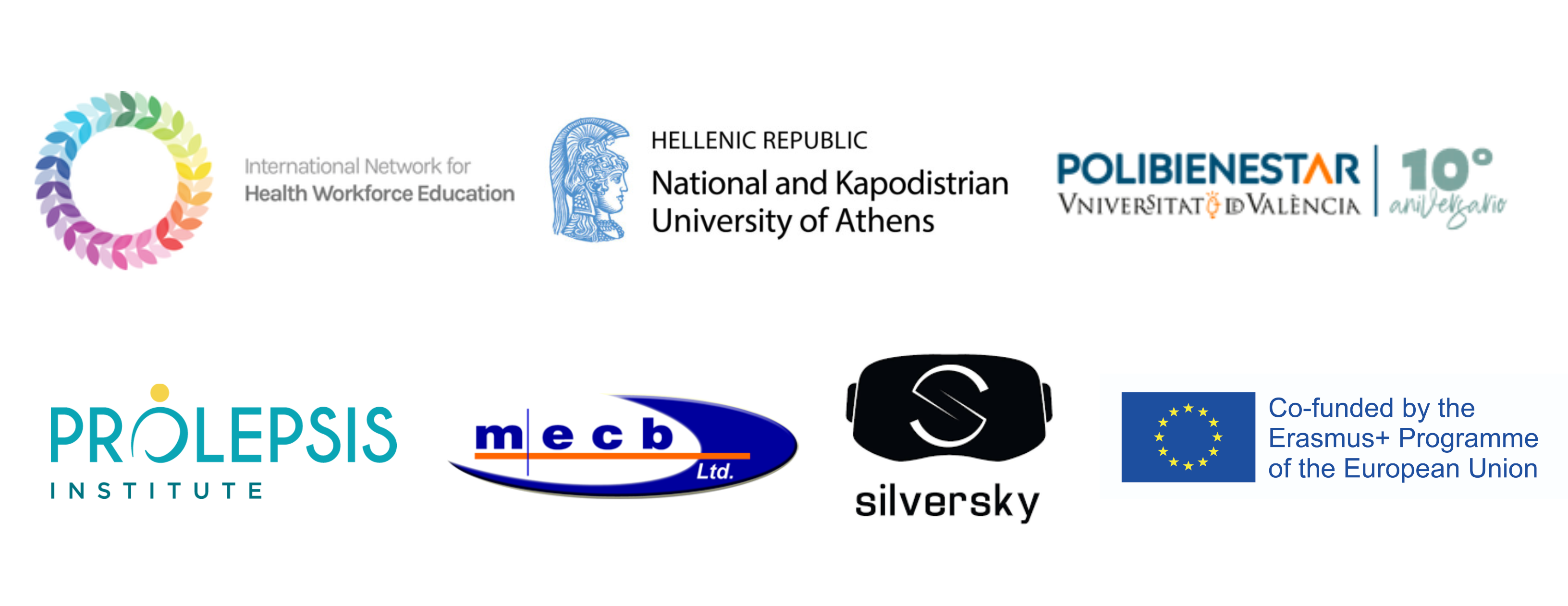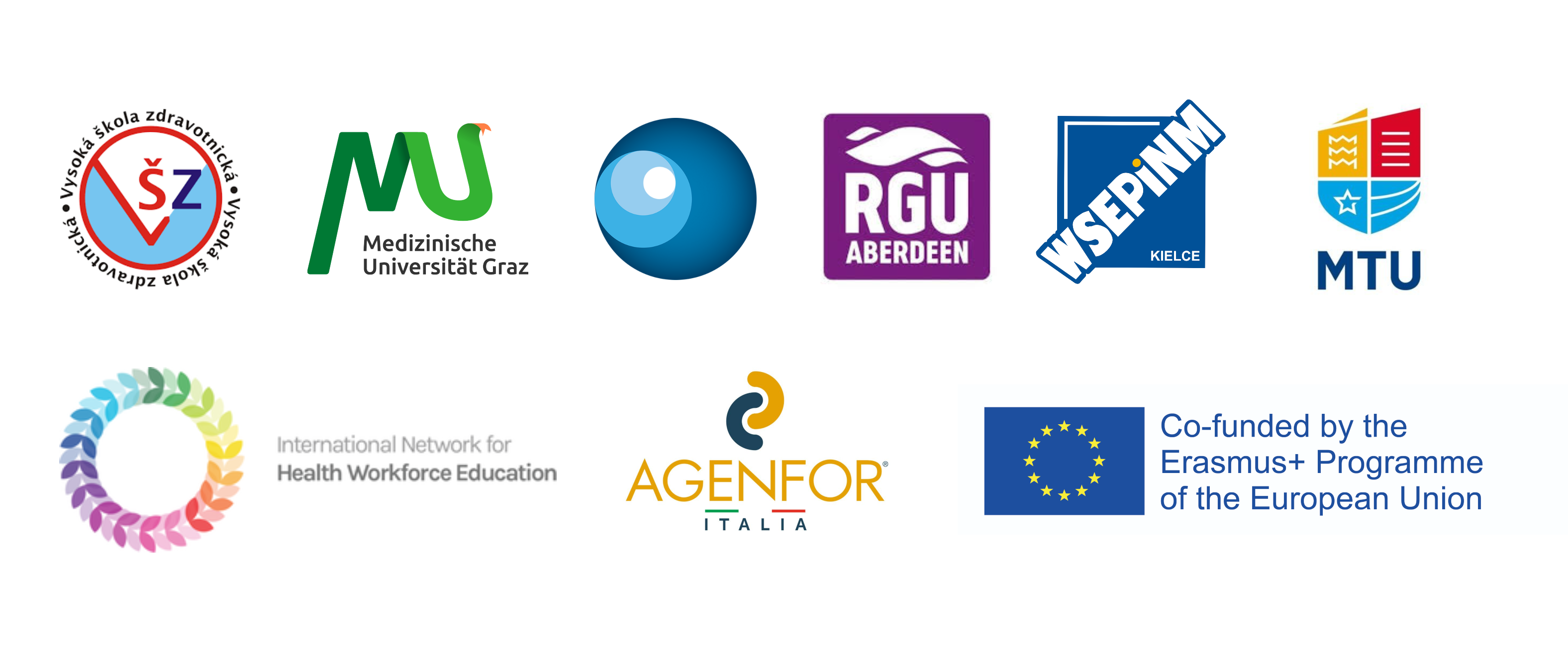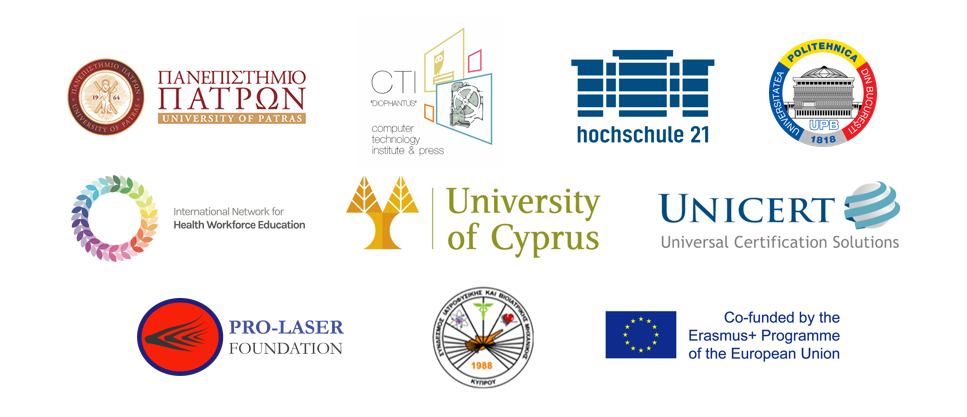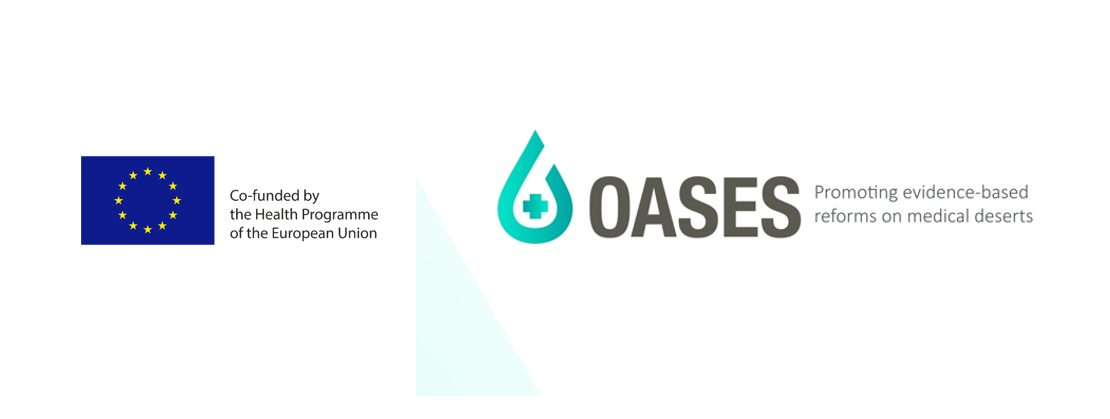Projects
We take part in many projects, often funded by the European Union. If you would like to see our ongoing project please kick the links below, if you would like to partner with us for a future project then please contact David Smith.
Our Projects

Why?
The VIPE Academy project aims to empower educators of healthcare students with the skills and resources needed to effectively facilitate
virtual interprofessional education (IPE), fostering collaboration across professional and geographical boundaries. The Virtual IPE Academy project will create inclusive interprofessional environments across Europe that provide accessible and equitable training opportunities for students that would otherwise not be available to them.
What?
The project will adopt a comprehensive and inclusive approach, beginning with the development of resource toolkit accompanied by four virtual IPE sessions for students across the EU and beyond. It will implement a multifaceted approach to enhance and build a community of educators who are highly skilled in training via virtual IPE. Case studies and scenario based learning activities will reflect real-world challenges, promoting diversity-sensitive practices in virtual IPE facilitation.
How?
The project will generate a suite of impactful results. A toolkit including an instructor manual and a strong facilitator network will build the foundation of the results to build educators’ capacity to run inclusive and accessible virtual IPE events. The consortium with the support of the VIPE community will run 4 virtual IPE events, alongside dedicated facilitator training, with the ultimate outcome of a global network of well-prepared educators who can drive effective online IPE collaboration.
When?
November 2025 to October 2027 (24 months).
Who?
International Network for Health Workforce Education (INHWE), Cyprus
University of Vic - Central University of Catalonia, Spain
Funded by the European Union. Views and opinions expressed are however those of the author(s) only and do not necessarily reflect those of the European Union or the European Education and Culture Executive Agency (EACEA). Neither the European Union nor EACEA can be held responsible for them.

ECHOES - ExChange Of ExpertiSe in healthcare professionals’ education
Why
The project aims to develop a digital platform that facilitates the exchange of expertise between healthcare universities, increasing access for students across Europe (and worldwide) to expertise that is currently unequally distributed. Additionally, the project seeks to upskill educators in digital skills for virtual exchanges, thereby enabling collaborations without the need for physical mobility and reducing the financial and environmental impact of teaching and learning activities. These exchanges will also help develop intercultural competencies among staff and learners and contribute to the European Union’s Internet of Things policy, demonstrating how IT can be further utilised in medical education.
What
The main outcome of this project is an increased exchange of expertise between universities through a digital platform that provides advanced expertise to more graduates across Europe (and worldwide), increasing the capacity of healthcare professionals and instilling a mindset of constant upskilling necessary to positively disrupt the status quo. In tangible terms, the project aims to have 250 experts and healthcare educators registered and actively using the platform, 500 participants training on the platform; publication of the research results (2 articles in Open Access) following the identification of the platform’s required features; 6 online actions developing the skills of experts to use the platform and undergo virtual exchanges; and events to disseminate the platform. Lastly, and most importantly, one functioning and user-friendly matchmaking and networking platform to link educators from across Europe.
How
The development of this digital platform will promote exchanges of expertise (WP3), based on prior research into stakeholders’ needs for the platform and recent advances in online training configurations (WP2). This will be followed by developing staff skills to perform virtual exchanges (capacity building, WP4) and a dissemination campaign targeting the European medical education market as well as a global audience (WP5). The main activities include project management; a research phase to identify the platform’s requirements; development and testing of the digital platform; webinars on virtual mobility and the platform; a congress to promote the platform; and online dissemination efforts. The beneficiaries include healthcare students (around 200k graduates per year in medicine, nursing, and midwifery in the EU alone), professionals (over 7 million healthcare professionals in Europe), educators, and academic institutions (Eurostat data).
When
December 2023 to November 2026. Project Website: https://echoesplatform.eu/about-us
Who
- University of Malta
- PMF
- RCSI
- INHWE
- TAMK

Why?
The SimPRENA project aims to address a critical need within healthcare education: preparing nursing and paramedic students to navigate the challenges of a violent healthcare environment with confidence and competence. Aggression and violence towards medical staff are pressing concerns that jeopardize both patient and staff safety. By providing simulation-based training, this project seeks to bridge the gap between theory and practice, empowering students and educators alike to effectively handle real-life scenarios. Through immersive experiences with role-playing and real actors, the SimPRENA project aims to foster a safe learning environment where students can develop essential clinical and decision-making skills.
What?
Through the implementation of simulation-based training activities, the SimPRENA strives to achieve several key objectives. Firstly, it aims to enhance the self-confidence of nursing and paramedic students by bridging the gap between theoretical knowledge and practical application. By engaging in simulation scenarios with real actors, students will develop critical thinking skills and learn to effectively cope with violence in healthcare settings. Additionally, the SimPRENA seeks to equip educators with the necessary tools and resources to facilitate simulation-based learning, thereby ensuring sustainability and scalability in training efforts. Ultimately, this project aims to create a comprehensive simulation package that empowers both students and teachers to navigate the complexities of the healthcare environment with confidence and competence.
How?
The SimPRENA takes a multi-faceted approach to achieving its objectives. Firstly, it will develop simulation scenarios and training materials tailored to the specific needs of nursing and paramedic students. These materials will be accessible through an e-learning platform, providing flexibility and convenience for learners. Additionally, it will conduct train-the-trainer courses to empower educators with the skills and knowledge to effectively facilitate simulation-based learning. By leveraging innovative teaching methods, such as interactive videos and role-play cards, it aims to create engaging and immersive learning experiences for students. Through ongoing evaluation and feedback, the SimPRENA project will continuously refine its approach to ensure maximum efficacy and impact.
When?
December 2023 to December 2025 (24 months). Project Website: https://simprena.eu/
Project Newsletter: https://simprena.eu/newsletter-library/
Project Leaflet: https://simprena.eu/2024/09/07/simprena-leaflet/
Who?
Munster Technological University (MTU), Ireland
Johanniter-Unfall-Hilfe e.V., Johanniter-Akademie Mitteldeutschland, Germany
Danmar Computers, Poland
Swietokrzyskie Stowarzyszenie Inicjatyw Spolecznych (SSIS), Poland
Medical College (VSZ), Czech Republic
International Network for Health Workforce Education (INHWE), Cyprus
Why?
The H-PASS project addresses critical challenges facing healthcare systems in Europe, particularly in the context of rapid digital transformation. With the advent of advanced technologies and evolving care pathways, there's a pressing need to ensure that healthcare professionals are equipped with the necessary skills and competencies to deliver high-quality care. The project recognises the importance of continuous education and development in the health workforce to adapt to these changes effectively. By focusing on enhancing team resilience and overcoming skills gaps, H-PASS aims to support EU Member States in building a digitally empowered healthcare workforce capable of meeting the demands of modern healthcare delivery.
What?
H-PASS seeks to achieve several key objectives aimed at improving healthcare team competencies and resilience. Through the design and pilot testing of a comprehensive training program, the project aims to equip healthcare professionals with up-to-date knowledge and skills in digital and transversal areas. By fostering knowledge sharing and exchange across EU Member States, H-PASS aims to address the challenges of skill mismatches and ensure that healthcare providers can effectively leverage digital solutions in their practice. Additionally, by training trainers and promoting the adoption of innovative learning environments, the project aims to facilitate the scaling up of digital literacy and integration in healthcare systems across Europe.
How?
The H-PASS project employs a multifaceted approach to achieve its objectives. Central to its methodology is the development of a tailored training program consisting of various modules and activities designed to enhance digital and transversal skills among healthcare professionals. Through a combination of synchronous and asynchronous learning methods, including interactive lectures, group discussions, problem-solving exercises, and practical skills training, H-PASS aims to provide a dynamic and engaging learning experience. Moreover, the project emphasises the importance of stakeholder involvement and evaluation to ensure the quality and effectiveness of the training courses. By adopting a comprehensive evaluation framework, H-PASS aims to assess the impact of its training programs at multiple levels, from participant satisfaction to changes in behaviour and organisational outcomes.
When?
May 2023 to April 2026 (36 months). Project Website: https://hpass.healthworkforce.eu/the-project/
Who?
National Directorate General for Hospitals (OKFŐ), Hungary
Agenzia Nazionale Per I Servizi Sanitari Regionali (AGE.NA.S), Italy
Azienda ULSS4 Veneto Orientale, Italy
International Network for Health Workforce Education (INHWE), Cyprus
Országos Kórházi Főigazgatóság, Hungary
European University (EUC), Cyprus
Lithuanian University of Health Sciences (LSMU), Lithuania
Universitatea din Oradea, Romania
Colegiul Judetean al Farmacistilor Bihor, Romania
Università Cattolica del Sacro Cuore, Italy
University of Crete, Greece
Scuola superiore di studi universitari e di perfezionamento Sant'Anna (SSSUP), Italy
Silversky3D, Cyprus
Semmelweis Egyetem, Hungary

VRHealthLeaders - A Multifaceted VR Learning Platform for Future Healthcare Leaders (2021-2023)
Why?
Digital solutions have the potential to radically transform education. Using virtual reality as a primary tool for leadership training can improve healthcare systems by broadening the experiences of healthcare leaders thus providing better outcomes, services and quality to patients across the EU. Virtual reality simulation offers educators the chance to provide students with experiential learning that would otherwise not be available to them.
What?
This project uses virtual reality to increase the leadership capabilities of future healthcare managers and policy makers using public health crises as the key theme of the training programme. Leadership education within healthcare is vital to healthcare systems. Health professionals are dealing with constant changes to both the systems they work in and the patients they serve. Equipping the health workforce with the skills to deal with this change is of pressing importance for educators, researchers, and policy makers.
How?
The project will:
- Develop a multifaceted toolkit to support healthcare educators teach leadership to healthcare professionals across Europe;
- Test and implement innovative virtual reality practices in healthcare leadership education;
- Develop a leadership curriculum that can be used for online, blended and distance teaching and learning;
- Develop a 'train the trainers' e-learning platform that supports teachers and trainers in adapting their leadership courses to online & distance learning;
- Test, evaluate and peer review the toolkit in multiple EU countries.
When?
The VRHealthLeaders project runs from May 2021 to April 2023. Project website: https://vrhealthleaders.eu/
Who?
- International Network for Health Workforce Education, Cyprus
- Universitat de Valencia, Spain
- Astiki Mikerdoskopiki Etaireia Prolipsis, Greece
- Ethniko kai Kapodistriako Panepistimio Athinon, Greece
- Macdac Engineering Consultancy Bureau LTD – MECB, Malta
- Silversky3d VR Technologies LTD, Cyprus
The European Commission support for the production of this publication does not constitute an endorsement of the contents which reflects the views only of the authors, and the Commission cannot be held responsible for any use which may be made of the information contained therein.

Digi4Health - A Digital VET Toolkit for Promoting the 4th Industrial Revolution in the European Health Sector
Why?
As outlined in the 2018 EC document 'Enabling the digital transformation of health and care in the Digital Single Market,' digital solutions for healthcare can increase the well-being of millions of citizens and radically change the way healthcare is delivered to patients. Emerging technologies such 3D Printing and Virtual Reality provide means by which healthcare professionals will be increasingly supported in their work, all aimed towards enhancing interprofessional cooperation and ultimately personalised patient care. As a result of these technologies, we are starting to see the impact of the 4th industrial revolution on healthcare, known as Health4.0.
What?
Educators and trainers of the health workforce need to be urgently assisted to catch up with the range of digital technology advancements taking place due to Health4.0. At the same time, as working adults, healthcare personnel have a difficulty to find the time to attend continuous professional development (CPD) courses. Nevertheless, these adult workers need to be supported learning about digital technologies infiltrating the health sector. For this reason, VET trainers as well as healthcare mentors need a Toolkit with an open repository of relevant training resources to aid them in helping healthcare personnel catch up with HEALTH4.0 technologies even in work-based settings.
How?
The primary aim of this Project called digi4HEALTH (A Digital VET Toolkit for Promoting the 4th Industrial Revolution in the European Health Sector) is to develop a novel digital toolkit by which European VET Trainers and health sector mentors can reach out and assist healthcare professionals and stakeholders to catch up with technologies of the 4th Industrial Revolution.
When?
The Digi4Health project runs from October 2019 to April 2022. For detailed information please visit www.digi4h.eumecb.com. Project summary by KAINOTOMIA: https://bit.ly/3GYXPq5
Who?
- MECB, Malta
- UPB-CAMIS, Romania
- KAUNAS STP, Lithuania
- INHWE, Cyprus
- KAINOTOMIA, Greece
- KVELOCE I+D+i, Spain
Final Conference
The Digi4H Final Conference, taking place on Friday 18th March 2022, is a free event that will provide attendees with all the skills they need to teach and understand digital technology in highly evolved healthcare systems. The confernece will be held in the Cultural Center at the European University Cyprus. The event will provide an overview of the current state of play of digital technology and skills in Europe, provide an overview and demonstration of the Digi4H toolkit and discuss future digital skills and technology with an international panel of speakers.
To register for the event and find out more please visit: https://inhwe.org/digi4h-final-conference
The European Commission support for the production of this publication does not constitute an endorsement of the contents which reflects the views only of the authors, and the Commission cannot be held responsible for any use which may be made of the information contained therein.

StoryAidEU - Humanizing Healthcare Education through the use of Storytelling (2019-2021)
Why?
Current healthcare training curriculum relies upon a comprehensive understanding of the bio-medical model of medicine. However, it has been recognised that a curriculum that incorporates a more rounded model is critical. To explore a new model of healthcare training, storytelling can become a crucial tool for educators to show the hidden and silent stories of both, patients, healthcare processional, loved one, and vulnerable people who are receiving care. At the same time Europe faces increased demand for health services due to ageing populations, rising patient mobility, and a diminishing supply of health workers caused by retirement rates that surpass recruitment rates. This places great emphasis on the health workforce with the majority of health system change enacted by healthcare professionals themselves.
What?
Storytelling can be used to ensure a round approach to healthcare professionals’ education and this project aims to build a truly interprofessional approach to storytelling. There is significant evidence to indicate that effective interprofessional education (IPE) is an innovative strategy that enables effective collaborative practice. Interprofessional education (IPE) is a necessary step in preparing a prepared health workforce. It is proven that collaborative practice strengthens healthsystems and improves health outcomes (WHO, 2010). Storytelling is best used in an interdisciplinary environment which this project will foster by creating an innovative multi-professional, inter-stakeholder approach to bridge the gap between current educational models and a more rounded model of the future.
How?
The project will conduct (through a number of data gathering techniques) a full review of interprofessional education tools from across the globe, an assessment of humanism policies and procedures on a macro and micro level in Europe and conduct essential research into how storytelling approaches can be used to improve healthcare training. These three areas will be combined into a dedicated training curriculum for healthcare educators. With the final outcomes being a coursebook, learning videos and an interactive lecture.
When?
The StoryAidEU project runs from October 2019 to September 2021. Project website: https://storyaid.eu/
Who?
- International Network for Health Workforce Education, Spain
- Wyzsza Szkola Ekonomii, Prawa i Nauk Medycznych im. prof. Edwarda Lipinskiego w Kielcach, Poland
- Munster Technological University, Ireland
- Vysoka Skola Zdravotnicka, Czech Republic
- Agenfor Italia, Italy
- StoryAid UK, United Kingdom
- Medical University of Graz, Austria
- The Robert Gordon University, United Kingdom
The European Commission support for the production of this publication does not constitute an endorsement of the contents which reflects the views only of the authors, and the Commission cannot be held responsible for any use which may be made of the information contained therein.

DIGI4ME - Health sector skill alliance for creating innovative and efficient VET programmes and improving the digital Skills of medical physics and health professionals (2020-2023)
Why?
The increasing demand for healthcare services, driven by demographic shifts throughout Europe will increase the number of jobs and the required skills of professionals in the health sector. Recently the need for digital skills for health care professionals is acknowledged at EU level. Health care professionals’ high competences and quality digital skills are acknowledged to be of extreme importance across all countries at European level. However, is pointed out in many European level reports that the digital skills of health professionals are not in line with the technological advances in the sector and in many cases and professions there is a huge gap to be bridged.
What?
Digi4He will provide a platform for digital skills training in the health care sector. EU Educational Institutes, VETs, Health Care Associations, and relevant EU Enterprises will exchange skills, experience, and accessibility to be embodied in a single high quality training framework improving Digital Skill training all over European Countries.
How?
EU Educational Institutes, VETs and Health Care Associations participating in the DIGI4ME project will a) exchange their long experience in order to be embodied in a single high quality training framework improving Digital Skill training; b) develop new innovative curricula and educational methods of health care training courses all over European Countries; c) establish/accredit the developed Open and distance learning framework to support the community of Health Professionals.
When?
The DIGI4ME project runs from November 2020 to October 2023. Project website: https://digi4me.eu/
Who?
- Panepistimio Patron, Greece
- Institouto Technologias Ypologistonkai Ekdoseon Diofantos, Greece
- Hochschule 21 Gemeinnützige GmbH, Germany
- International Network for Health Workforce Education, Cyprus
- University of Cyprus, Cyprus
- N Noulas-D Derpanis Ike, Greece
- Universitatea Politehnica din Bucuresti, Romania
- Fundatia Pro laser, Romania
- Filanthropiko Idryma Vioiatrikon Erevnon, Cyprus
The European Commission support for the production of this publication does not constitute an endorsement of the contents which reflects the views only of the authors, and the Commission cannot be held responsible for any use which may be made of the information contained therein.

SAFEMEDIC - Personal Safety of Medical Personnel in Difficult Professional Situations (2018-2020)
Why?
The International Labour Organization ranked medical professions as the second most vulnerable to violence in the workplace. This view is supported by the consortium’s pre-project research which saw a questionnaire disseminated to key stakeholders and received over 1000 responses. Results showed that only 5.9% respondents with previous patient contact said that they had never been verbally assaulted by patients and 62.5% were victims of physical assault by patients at least once.
What?
The chief goal of the project is to improve the workplace safety of healthcare professionals by increasing their skills and competences in dealing with difficult situations. To achieve this the project consortium will design and develop a complex multi-stakeholder, inter-disciplinary course for healthcare students, predominantly focused at paramedics and nurses. The didactic materials and project’s intellectual outputs will also be accessible to the rest of the health workforce such as physicians and physiotherapists.
How?
The project will develop an educational course which will result in an increase in the conflict management skills and knowledge of healthcare professionals. The course will create a uniform, comprehensive and complete programme applicable to all partner countries of the consortium, while also being adaptable enough for use in the rest of Europe and beyond. The majority of educational materials will be available online, free of charge, in the form of multimedia interactive materials realised in a Moodle format. Project Website: https://www.safemedic.eu/
When?
The SAFEMEDIC project runs from November 2018 to October 2021.
Who?
- Wyzsza Szkola Ekonomii, Prawa i Nauk Medycznych im. prof. Edwarda Lipinskiego w Kielcach, Poland
- International Network for Health Workforce Education, Spain
- Institute of Technology Tralee, Ireland
- Vysoka Skola Zdravotnicka, Czech Republic
- Alma Mater Europaea-Evropski Center, Slovenia
- Kauno Kolegija, Lithuania
The European Commission support for the production of this publication does not constitute an endorsement of the contents which reflects the views only of the authors, and the Commission cannot be held responsible for any use which may be made of the information contained therein.

OASES - prOmoting evidence-bASed rEformS (2021-2024)
OASES is a 3-year long research project (No. 101018341) co-funded by the Health Programme of the European Union, led by a consortium of European partners. OASES intends to become a source of knowledge on European medical deserts carrying out an analysis of medical desertification in Europe. Findings from the implementation of various pilot studies will provide insights, useful cases and evidence on possible measures to mitigate desertification, which can inform policy makers to enhance their healthcare reforms and workforce policy capacities.
Why?
The expression of medical desert is commonly used in the public and mediatic field referring to several situations or areas where people have difficulties to access care (e.g. waiting time, doctor’s registration difficulties or long distances to hospital). The identification of such areas became a major issue and is exacerbated by the fact that the accessibility itself is complex to address due to its multidimensional nature (spatial, physical, temporal, financial, and cultural).
What?
The OASES proposal aims to represent a source of knowledge in European medical deserts, reinforcing the capacity of health authorities of EU Member States to reform their health systems and address all the important aspects to successfully tackle the challenges that the medical desert is posing, with specific regard to actions focusing on skill mix, task shifting, use of e-health and IT systems, recruitment and retention management and policies, in order to guarantee universal coverage also in rural and underserved areas.
How?
The project presents and supports the application of a stepwise methodology focused on a) definition of a measurement methodology and tool applicable in different contexts (minimal, intermediate, advanced dataset); b) implementation of the measurement methods and tools in selected pilot sites of 7 European countries; c) assessment, policy actions analysis and sustainability in each pilot site, d) impact evaluation in each pilot site and updating the measurement methods and tools according to the pilot results; e) scaling up of the methods and of the policy actions at EU level.
When?
The OASES project runs from March 2021 to February 2024. Project website: https://oasesproject.eu/. The downloadable leaflet can be found here. Contact: oasesproject@agenas.it
Who?
Agenzia Nazionale per i Servizi Sanitari Regionali, Italy (Coordinator)
Semmelweis University, Hungary
International Network for Health Workforce Education, Cyprus
Universitatea Babes Bolyai, Romania
Agentia Nationala Pentru Sanatate Publica, Moldova
Terveyden ja Hyvinvoinnin Laitos, Finland
École des Hautes Études en Santé Publique, France
The content of this page represents the views of the author only and is his/her sole responsibility; it cannot be considered to reflect the views of the European Commission and/or the European Health and Digital Executive Agency (HaDEA) or any other body of the European Union. The European Commission and the Agency do not accept any responsibility for use that may be made of the information it contains.

